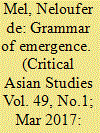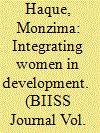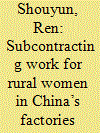| Srl | Item |
| 1 |
ID:
151734


|
|
|
|
|
| Summary/Abstract |
This essay studies the impact of the 2004 Asian Tsunami on a marginalized ethnic community of Burghers in Batticaloa, Eastern Sri Lanka. Through a case study of the displacement and re-settlement of Burgher women, their role in a cooperative society, and property ownership strategies, the essay argues that while gender positions may not have altered significantly at the macro level, changes have occurred at a micro-political level, and that these “small changes from below” mark the emergence of the women as a political community. It also points to the need, if these transformative practices are to be deepened and sustained, for developmental actors such as the state and international donors to recalibrate their approaches to rural women. This includes placing greater value on local social practices such as matrilineal inheritance that favor women in Eastern Sri Lanka.
|
|
|
|
|
|
|
|
|
|
|
|
|
|
|
|
| 2 |
ID:
140303


|
|
|
|
|
| Summary/Abstract |
The global movement for the recognition of women’s rights as human rights attempted to identify those rights crucial to the well being of women. The Universal Declaration of Human Rights (1948) and other subsequent assertion of equal rights to men and women in spite of their sexual identity are very crucial in this regard. Conventional wisdom suggests that the progress towards equality for men and women has not been satisfactory in developing countries like Bangladesh where women are subject to exclusion as a result of the ‘socialeconomic-political’ as well as ideological privileges of men evident in the patriarchal structure of the society. The paper argues that although women’s presence and participation in the development process of Bangladesh have not been adequate, the initiatives at various levels to address this inadequacy and progressive movements of women in diverse sectors of Bangladesh have brought in a number of affirmative changes. With this aim, the paper attempts to review the current status of women in the political, economic and social development of the country and examines the strengths and limitations of integration of women in mainstream development structure.
|
|
|
|
|
|
|
|
|
|
|
|
|
|
|
|
| 3 |
ID:
153639


|
|
|
|
|
| Summary/Abstract |
Industrial subcontracting work in rural China has been framed as a win-win strategy for women and industry. Drawing on fieldwork conducted in Hebei Province, I argue that far from being the main beneficiaries of subcontracting work, such rural industrialization has instead subjected women to a gendered form of capitalist exploitation. First, the women employed were not a random group but were young, healthy women who already had industrial skills, and thus did not need training. Second, these women were rendered immobile by their family responsibilities. Third, the problems of ‘left-behind’ children and an urban, modern notion of motherhood trickling down to the countryside has constructed a notion of virtuous motherhood. Further undermining their position, women workers had no influence over production or profits in the subcontracting chain. Despite the promise that subcontracting work would be flexible for women, such flexibility benefits the production chain more than women workers. Local (and changing) gender and development dynamics in rural China condition the experiences of women involved in initiatives that are seen as a win-win situation by some development agencies, advocacy groups and policy researchers.
|
|
|
|
|
|
|
|
|
|
|
|
|
|
|
|